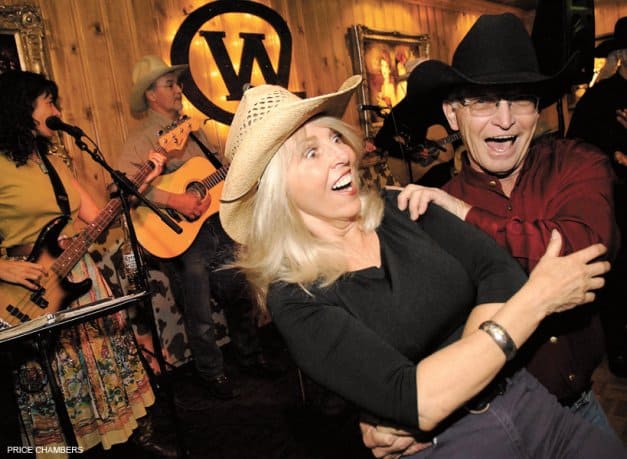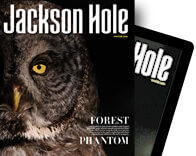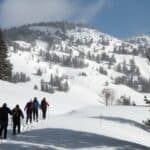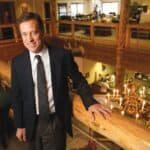Read The
Current Issue
Dance the Night Away
Newbie or old hand, there’s a place for you to kick up your heels cowboy-style.
BY JAYME FEARY

“Let’s burn it down, burn it down,” whines the lead singer for One Ton Pig, an outlaw Americana band that has packed the Silver Dollar Bar’s small dance floor with cowboys, faux cowboys, outdoor enthusiasts, skiers, granola heads, moneyed ranchers, and hippies. The booty shakers and swing dancers in tennis shoes, flips-flops, and penny loafers wag their tails in the middle while couples in boots three-step around the perimeter in a swirling mass. It’s like this every Tuesday night here.
Snow flitters down outside. The pink neon stripe around the top of the S-shaped bar tints the place the color of sunset. Spotlights illuminate the cedar walls and the original Ray McCarty paintings of cowboys and saloon girls hanging on them. On this best night of the week to dance at the Silver Dollar, inside the Wort Hotel in downtown Jackson, everybody is here: locals, seasonals, and tourists.
Local chiropractor and horseman Chris Koch, wearing boots, baggy Wranglers, suspenders, and a cream-colored felt hat, grabs Deb Kanter, one of the best women dancers in town, and in his trademark hoedown style, rocks and spins her. Her skirt wheels, and Chris’ white Fu Manchu mustache, surrounding his mouth like a door frame, widens into a smile.
In comes Ralph Boyack, a TSA agent at the airport, sporting his goatee, potbelly, and a black hat, which covers his bald head. Ralph lives to dance. In seconds, he has identified every danceable hottie in the saloon. He grabs the hand of a tall one—a well-endowed twentyish brunette with a newscaster hairstyle, Daisy Dukes, and western boots—and triple-steps her around. The closer he draws her, the more strained her smile becomes, but he’s Fred Astaire in boots so she squelches her objections and enjoys the ride. As the song ends, he spins her one last time and extends his leg. Every local knows what is about to happen. Using his thigh as a fulcrum, he dips the girl, tilting her legs upward. Before she can exit the floor, he whisks her off for another. Six songs pass before she breaks free.
It goes on like this until late. Food and libations flow, the music blares, and the whole joint pitches and rolls.
The Whatchamacallit musicians at the Million Dollar Cowboy Bar sound like the house band for a Ramada Inn lounge, but the drummer, bass, and lead guitarist get on the same beat long enough for dancers to make a turn or two around the floor. Tourists sit on saddle barstools, shoot pool, people watch, or stare around the room at miles of knotty pine, western murals, and a full-mount grizzly standing on its back feet with its paws forward like Muhammad Ali.
Most of the tourists must’ve missed the Cowboy’s free Thursday night dance lessons (they start at 7 p.m. every Thursday during the winter and summer), for at first they only observe. The seven locals here this Saturday night have their choice of partners. Dressed in jeans, boots, and a western hat, one elderly man plays the role of teacher and dances with every young girl he can. Without rhythm, he twitches around the floor as if having an epileptic seizure. A seasonal visitor—a seventyish hippie in polyester pants, tortoise shell glasses, and a newsboy hat—throws down make-love-not-war dance moves, thinking he is impressing a woman young enough to be his granddaughter. She dances three feet from him and avoids eye contact.
Deb is whirling her skirt again tonight. Eighty-something Claire is here, too. (It’s funny, everyone knows Claire, but no one knows his last name or how to find him away from the dance floor.) Dressed in Wranglers and a western shirt and ball cap, Claire thrills every woman he dances with because he looks like everybody’s grandpa and can keep the beat. One after another, tourists work up the nerve to dance. Once on the floor, they remain. And wouldn’t you know, here comes Ralph. As usual, he favors the young and beautiful, drawing them close and dipping them at the end of every song.
The big surprise tonight is an appearance from Ted Benson, maybe the most-appreciated male country dancer in Jackson. Only fifty-one, Ted was nearly killed by cancer. It ripped him away from dancing until a bone marrow transplant gave him a fighter’s chance. After each song, he wipes his forehead and leans against the railing. His presence makes the Cowboy Bar seem whole again. Off he goes, a bowling ball of a man gliding across the floor. A few tourists ask him to dance, and he obliges even the beginners.
Ted doesn’t last long, though. The clock ticks on, and the band shifts from country music to rock. Locals abdicate the place to tourists, who stream onto the floor gyrating and twerking. Music and alcohol lubricate the party until closing time.
Derek the Dynamo rakes his electric guitar while Phil Round leans into the microphone: “The road goes on forever, and the party never ends!” Having played at the Stagecoach Bar every Sunday night since 1969, The Stagecoach Band is overheating this concrete-floored box at the base of Teton Pass in Wilson. The temperature outside lingers near zero and the windows stand open, but the dancers are dripping sweat.
Every type of person in the valley is here: cowboys real and fake, skiers and snowboarders, snowmobilers, hippies, and corporate magnates. The crowd’s age averages fifty or so. A middle-aged guy wearing khakis like Jungle Jack Hanna dances with a Janis Joplin look-alike. Beyond caring what people think, he flails like an octopus on speed.
Onto the stage steps silver-haired Hort Spitzer decked out in a silk scarf and a pinched felt hat with a hole in the crown. The locals—80 percent of the crowd—know the routine. For the umpteenth time, Hort yowls like a coyote in heat to the polka “Airplane Yodel.” When the song is nearly over, everybody cheers. The last drumbeat sounds, and Hort throws his hat onto the floor.
Barb Conitz perches on her usual stool at the end of the bar. A few years back, she nearly died in a car crash. No one minds that she dances a little slower now. Having her here is enough. After dancing with the same men for years, she knows their every move but doesn’t complain about the repetition. She simply holds on tight, bobbles her head, and smiles.
A few songs later, everybody but the onlookers grabs the first available partner. The dancers form two long lines and hold their partners’ hands in the air like “London Bridge.” It soon stretches almost to the pool tables from where the couple on the end peels off, dances back, and ducks through the bridge. Deb spins. Mr. Octopus-on-Speed almost throws out a hip, and Ralph hugs up some sweet young thing that he holds onto for five more songs before finally dipping her over his knee.
The music builds until the regulars recognize the final tune. Again, everyone scurries to find a partner. “Keep on the sunny side, always on the sunny side. Keep on the sunny side of life. …” The dancers and onlookers clap and cheer because the song embodies everything these nights are about.
Outside, the snow falls hard, but no one notices or cares. The crowd rotates like a hurricane, dancers kicking up their heels and smiling at anybody whirling by. “It will help us every day, it will brighten all the way, if we keep on the sunny side of life.”
A woman reaches out and drags this writer from his dark corner of observation onto the floor. And the night wheels.




